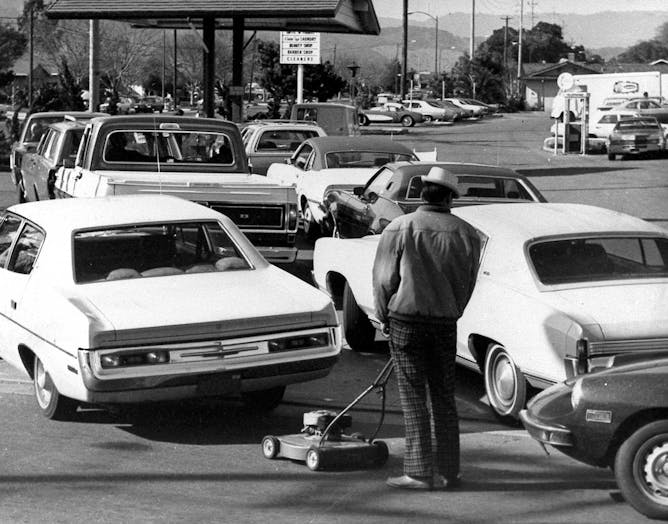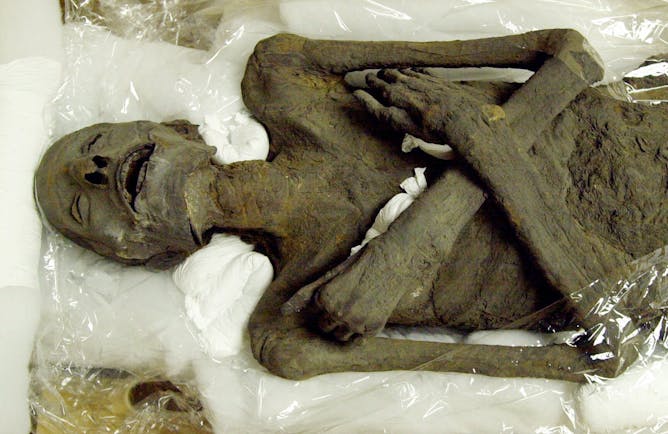| |
|
|
|
|
|
|
| |
|
Editor's note
|
|
The Trump administration is pulling back fuel economy standards, negotiated under President Obama, that required new passenger cars and trucks to be twice as fuel-efficient as current models by 2025. This shift has big implications for oil use, air quality, climate change – and consumers’ wallets. As economist James Sallee of the University of California, Berkeley observes, if U.S. consumers drove 1970s-style gas guzzlers today, they would spend thousands of dollars more on gasoline annually.
The DNA contained in human remains can help scientists answer questions about the long history of our species. But a rush to the lab might overlook ethical concerns from present-day descendants or communities of the individuals in question. Anthropologist Chip Colwell describes how “the current ‘bone rush’ to make new genetic discoveries has set off an ethical crisis.”
Every day we have disagreements with friends, family and co-workers that don’t do lasting damage to our relationships. So why do we feel so anxious whenever anything political gets raised – especially if it’s in front of someone we know doesn’t hold the same views? University at Buffalo’s Melanie Green wanted to explore this phenomenon, so she conducted a study that explores why we feel stressed and threatened when we argue over some things but not others.
|
Jennifer Weeks
Environment + Energy Editor
|

|
|
Top Stories
|

Customers line up to buy gasoline in San Jose, California, on March 15, 1974, during an Arab oil embargo. The crisis spurred enactment of the first U.S. vehicle fuel economy standards.
AP
James M. Sallee, University of California, Berkeley
Since the federal government started setting fuel economy standards, US-built cars have doubled their fuel efficiency, saving money for consumers and reducing pollution.
|

Who gets to decide for the dead, such as this Egyptian mummy?
AP Photo/Ric Feld
Chip Colwell, University of Colorado Denver
Are DNA samples today's version of the human skeletons that hung in 20th-century natural history museums? They can provide genetic revelations about our species' history – but at an ethical price.
|

The prospect alone can make you want to avoid the person altogether.
faber1893/Shutterstock.com
Melanie Green, University at Buffalo, The State University of New York
We can disagree with co-workers in meetings. We can argue about sports with friends. A new study explores why politics seems to be an entirely different beast.
|
|
|
Environment + Energy
|
-
Nicholas Bryner, University of California, Los Angeles; Meredith Hankins, University of California, Los Angeles
Air pollution could be the next battleground between California and the Trump administration, which is reviewing the Golden State's special legal authority to regulate tailpipe emissions.
-
Deron Burkepile, University of California, Santa Barbara; Mark C. Ladd, University of California, Santa Barbara
With coral reefs in crisis around the world, many organizations are working to restore them by growing and transplanting healthy corals. A new study spotlights techniques that help restored reefs thrive.
-
Jeffrey B. Halverson, University of Maryland, Baltimore County
Why can't meteorologists call the weather correctly every time? Blame the battle of the weather models.
|
|
|
|
Politics + Society
|
-
Derek H. Alderman, University of Tennessee
When activists have sought to rename main thoroughfares that don’t serve just primarily black neighborhoods, they have faced many challenges.
-
Fabio Andres Diaz, International Institute of Social Studies; Magda Jiménez, Universidad Externado de Colombia
Nearly 300 community organizers and activists have been killed in Colombia since the country's 2016 peace accord. Who's behind these targeted assassinations?
|
|
From our International Editions
|
-
James Ohman, Liverpool John Moores University; Asier Gomez-Olivencia, University of the Basque Country
It's time we changed our stereotype of the brutish, thuggish Neanderthals, and instead start viewing them with the respect they really deserve.
-
Ronald Labonte, University of Ottawa
The U.S. is vehemently opposed to Canada's intention to put labels on unhealthy processed foods. Here's why Canada should continue to stand its ground during NAFTA renegotiations.
-
Mark Blaskovich, The University of Queensland
Superbugs used to pose the greatest risk to people with compromised immune systems and those who had surgery. But their sexual transmission means antibiotic resistance can spread much more widely.
|
|
|
|
| |
| |
|
|
|
|
|
|
|
|